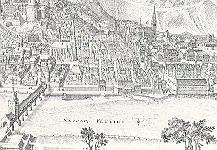The Nature of Universities during Luther's Time
German Universities

Founding years of selected German universities:
- 1385 Heidelberg
- 1379 Erfurt
- 1388 Cologne
- 1402 Wuerzburg
- 1409 Leipzig
- 1476 Tuebingen
- 1502 Wittenberg
Enrollment at selected German universities:
| 1501-05 | 1506-10 | 1511-15 | 1516-20 | 1521-25 | 1526-30 | 1531-35 | 1536-40 | 1541-45 | |
|---|---|---|---|---|---|---|---|---|---|
| Heidelberg | 576 | 762 | 853 | 707 | 445 | 238 | 398 | 486 | 493 |
| Tübingen | 444 | 625 | 604 | 458 | 351 | 272 | 301 | 444 | 440 |
| Leipzig | 2118 | 2250 | 2340 | 1770 | 941 | 500 | 733 | 859 | 1502 |
| Erfurt | 1314 | 1348 | 1434 | 1537 | 271 | 125 | 303 | 357 | 338 |
| Wittenberg | 1204 | 878 | 1038 | 1714 | 1069 | 716 | 1061 | 1674 | 2928 |
What did Luther Study?
Before one was allowed to move on to specialized fields of study, such as medicine, law or theology, students had to master the seven liberal arts (artes liberales). This ensured basic knowledge which qualified one for scholarly work.The Seven Liberal Arts
The division of the seven liberal arts goes back to Hrabanus Maurus (like Melanchthon, also called 'Teacher of Germany' (Praeceptor Germaniae) 784 - 856), an author from the 8th century. Education within these subjects was indispensible for students in the Middle Ages up to the Modern Ages to get used to university life.
- Grammar:
"knowledge which teaches poets and historians to explain as well as the proper manner of speaking and writing" - Rhetoric:
"instruction on giving good speeches" - Mathematics/Logic:
"The discipline which covers abstract quantities and dimensions" - Arithmatic:
"science of numbers in and of itself" - Geometry:
"graphic description/portrayal of how forms come into existence" - Music:
"science which deals with numbers, primarily with those which are to do with tones, such as the double, triple, quadruple and so forth" - Astronomy:
"science which deals with the movement and constellation of the stars"
Within the university system, the first academic level one could achieve, was the Baccalaureate. When the university education was finished, one received the title "Magister artium" (Master of Arts). At this point, one could choose a specialized field of study.
Luther did this as well; he began studying law in 1505, but left school to enter the monastery in Erfurt to become a monk. In 1507 he resumed his studies at the University of Erfurt, but this time he studied Theology.